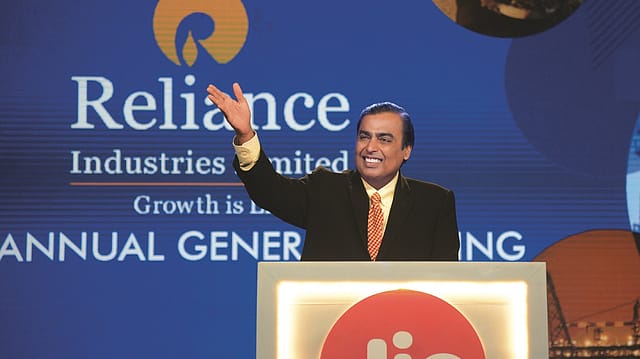RIL announces big-bang entry into wired broadband
ADVERTISEMENT

During his annual address to shareholders in July 2018, Mukesh Ambani, chairman of Reliance Industries Ltd (RIL) and India’s richest billionaire, had committed to reach as many as 50 million Indian households across 1,100 cities through the company’s proposed fixed-line broadband service called Jio GigaFiber, in the shortest possible period of time.
Three months later, the oil-to-yarn and retail-to-telecom conglomerate is well on its way to reach close to half that target in a single swoop. On Wednesday, RIL announced acquisitions of majority stakes in two leading wire-line broadband and cable television companies of the country—Den Networks, and Hathway Cable and Datacom—for an aggregate consideration of over ₹5,230 crore.
RIL will acquire a 66% stake in Den through a primary investment of ₹2,045 crore via a preferential issue and secondary purchase of shares worth ₹245 crore from the existing promoters, led by Sameer Manchanda. It will also spend ₹2,940 crore through a preferential issue to acquire a shade over 51% in Hathway, which is a part of the Rajan Raheja group.
The conglomerate will also make the mandatory open offer for additional shares of Den, Hathway and the latter’s subsidiaries: GTPL Hathway and Hathway Bhawani Cabletel and Datacom.
The acquisitions will give Reliance Jio Infocomm, RIL’s telecom arm, immediate access to 24 million households across 750 Indian cities. Jio will sell its Jio GigaFiber (high-speed fixed-line broadband services) and Jio Smart-Home solutions to these customers.
After disrupting the wireless broadband market with the launch of high-speed data services at rock-bottom prices, Ambani had promised that Jio will do the same in the wire-line broadband market. Sceptics had pointed out that rolling out Jio GigaFiber on the scale that RIL is typically known for (as well as the scale at which it launched Jio mobile data services) may be more cumbersome, given challenges surrounding last-mile connectivity in several towns and cities across India. This is because securing the right of way to take the optic fibre cable network right to the doorsteps and living rooms of Indian households is a laborious task. RIL’s acquisition of stakes in Den and Hathway clearly demonstrates that it believes inorganic growth to be best route to help Jio GigaFiber quickly gain scale. This is quite unlike the mobile data network of Jio, which has been completely built ground-up.
“After having taken India to the top position in the mobile broadband space, Reliance is now committed to take India from a global rank of 135 to among the top three in the world on wireline digital connectivity,” a statement issued by RIL after market hours on Wednesday said.
The statement also outlined that RIL’s acquisition of Den and Hathway will be beneficial for the 27,000 local cable operators that are aligned with these two service providers, as it will give them more teeth to face competition from larger, corporate-backed DTH (direct-to-home) TV service providers such as Tata Sky and Airtel TV. RIL can help these local operators with access to “superior back-end infrastructure,” tie-ups with content producers, access to business platforms that can help improve operational efficiencies, and investment in digital infrastructure to connect consumers, the company said. RIL also stated that DTH operators had weaned off 60 million households away from the local cable operators who have remained basic TV service providers. Over the past 25 years, India has connected about 175 million homes with basic co-axial cable television technology.
For the likes of Den and Hathway, partnering with Jio—which threatens to disrupt their existing business model through technology and pricing—may have been the only way to secure their future. Like with Jio’s mobile broadband services, Jio GigaFiber, too, promises to offer more than just a high-speed data pipe to consumers. It also promises to deliver content, smart home solutions like remote security monitoring; and all of this at a competitive price.
RIL also declared its financial results for the second quarter of 2018-19 (July-September) on Wednesday and beat Street expectations. The conglomerate reported a consolidated net profit of ₹9,516 crore, up 17.4% year-on-year (y-o-y), on a consolidated turnover of ₹1.56 lakh crore, up 54.5% y-o-y.
Sequentially, the Mumbai-headquartered company’s revenue rose 10.3% and net profit rose a marginal 0.6%.
Stellar operating profit from the company’s petrochemicals, retail and digital (Jio) verticals offset the relative weakness in the refining margins reported by the company.
“Our company delivered robust operating and financial results for the quarter despite macro headwinds, with strong growth in earnings on a year-on-year basis,” Ambani said in RIL’s earnings statement. “Our integrated refining and petrochemicals business generated strong cash flows in a period of heightened volatility in commodity and currency markets. The financial performance of both retail and Jio reflect the benefit of scale, technology and operational efficiencies. (The) retail business Ebitda (earnings before interest, tax, depreciation and amortisation) has grown threefold on a year-on-year basis whereas Reliance Jio Ebitda has grown nearly 2.5 times.”
The RIL earnings statement said the increase in revenue was primarily on account of higher price realisation at its petrochemicals and refining businesses, due to a 44.5% increase in Brent crude oil price; as well as higher volumes.
RIL’s refining business was under some pressure during the quarter, with gross refining margin averaging $9.5 per barrel, versus $12 in the corresponding period in FY18, and $10.5 in the April-March quarter.
RIL’s share price lost 1.27% on the BSE on Wednesday to close at ₹1,148.90 per share. The bourse’s benchmark equity index, the S&P BSE Sensex, lost 1.09% to end at 34,779.58 points on the same day.